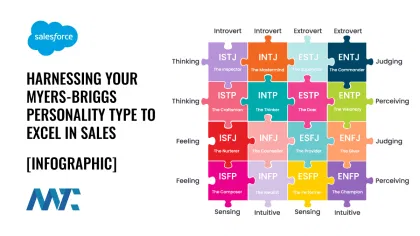
Sales is a dynamic field that demands adaptability, communication skills, and an understanding of human behavior. While traditional wisdom often suggests that extroverted personalities dominate in sales, the Myers-Briggs Type Indicator (MBTI) reveals that people with any personality type can succeed by leveraging their unique strengths.
Understanding your Myers-Briggs personality type provides insights into your communication style, decision-making preferences, and work habits, allowing you to tailor your sales approach to your strengths.
Table of Contents
Myers-Briggs is a widely used personality assessment based on the psychological theories of Carl Jung. It categorizes individuals into 16 distinct personality types, each represented by a combination of four dichotomies. These categories help individuals better understand their preferences, behaviors, and tendencies, making MBTI a valuable tool for personal and professional growth.
The Four Dichotomies of Myers-Briggs and Sales
- Extraversion (E) vs. Introversion (I): Extroverts thrive on external stimulation and excel at networking, cold calling, and spontaneous interactions. Conversely, introverts prefer deep, one-on-one conversations, excel at listening, and build long-term customer relationships.
- Sensing (S) vs. Intuition (N): Sensing types focus on facts and practicality, ideal for presenting detailed product features and immediate benefits. Intuitive types excel in discussing abstract ideas and long-term visions, which can inspire prospects about the future impact of a product.
- Thinking (T) vs. Feeling (F): Thinkers rely on logic and data-driven arguments, making them adept at addressing objections and discussing costs. Feelers prioritize empathy and harmony, building rapport and focusing on the emotional benefits of a product or service.
- Judging (J) vs. Perceiving (P): Judgers prefer structured approaches and timelines, excelling at following up and closing deals promptly. Perceivers’ adaptability and spontaneity help them navigate changing client needs and explore creative solutions.
The 16 Myers-Briggs Personality Types in Sales
Analysts
Analysts rely on their problem-solving abilities, strategic thinking, and ability to see patterns that others may miss to succeed in sales.
- ENTP (The Debater): Bold, innovative, and strategic thinkers who thrive in brainstorming sessions and enjoy solving complex customer challenges.
- ENTJ (The Commander): Assertive, goal-oriented leaders who excel in structuring deals and motivating teams to achieve sales targets.
- INTP (The Logician): Analytical and curious problem-solvers who focus on understanding customer pain points and designing logical solutions.
- INTJ (The Architect): Visionary planners who create long-term strategies for building customer trust and loyalty.
Diplomats
Diplomats excel in building connections and fostering trust with prospects, thanks to their empathy, intuition, and motivational energy.
- ENFP (The Campaigner): Charismatic and energetic, ENFPs excel at connecting with prospects personally and inspiring them to take action.
- ENFJ (The Protagonist): Empathetic and persuasive, ENFJs build trust and lead customers to see the value in their offerings.
- INFP (The Mediator): Idealistic and values-driven, INFPs connect deeply with clients and highlight their products’ ethical and emotional impact.
- INFJ (The Advocate): Insightful and compassionate, INFJs focus on understanding customers’ needs and providing tailored solutions.
Sentinels
Sentinels bring reliability and organization to the sales process, using their strong sense of responsibility and attention to detail to build trust and ensure results.
- ESTJ (The Executive): Organized and dependable, ESTJs manage sales processes efficiently and thrive in structured environments.
- ESFJ (The Caregiver): Warm and people-focused, ESFJs build rapport quickly and foster long-term client relationships.
- ISTJ (The Inspector): Reliable and detail-oriented, ISTJs excel in presenting facts and ensuring product reliability.
- ISFJ (The Defender): Loyal and nurturing, ISFJs go the extra mile to ensure customers feel valued and supported.
Explorers
Explorers excel at improvisation and adapting to the fast-paced, ever-changing nature of sales environments.
- ESTP (The Entrepreneur): Bold and action-oriented, ESTPs thrive in high-energy sales environments and easily handle objections.
- ESFP (The Entertainer): Fun-loving and engaging, ESFPs excel at building excitement around their products and services.
- ISTP (The Virtuoso): Hands-on and practical, ISTPs focus on demonstrating tangible benefits and solutions.
- ISFP (The Adventurer): Creative and empathetic, ISFPs tailor their approach to match each client’s unique needs and preferences.
Why Both Introverts and Extroverts Succeed in Sales
The idea that extroverts dominate in sales is a misconception. Research shows that introverts and extroverts bring unique advantages:
- Introverts: Known for their ability to listen deeply, prepare meticulously, and build lasting relationships, introverts excel at understanding and addressing customer needs.
- Extroverts: With their natural charisma, adaptability, and ability to connect instantly, extroverts shine in networking and making quick impressions.
By recognizing these strengths, sales teams can balance personalities to create a comprehensive approach to customer engagement.
Applying Myers-Briggs Insights to Sales
To enhance sales performance, each Myers-Briggs type can play to its strengths while addressing potential challenges in its approach:
- For Introverts: Focus on email or written communication, prepare in advance and leverage in-depth conversations to build trust.
- For Extroverts: Prioritize face-to-face or phone communication, reach out frequently, and use your energy to motivate prospects.
- For Sensors: Share concrete facts, timelines, and practical benefits of your offerings.
- For Intuitives: Emphasize the big picture and future possibilities of your solutions.
- For Thinkers: Showcase logical benefits and provide data to support your claims.
- For Feelers: Highlight emotional and social impacts while connecting personally with your prospects.
- For Judgers: Stick to timelines, prepare agendas, and follow up promptly.
- For Perceivers: Stay adaptable, explore creative approaches, and embrace spontaneity in interactions.
Success in sales isn’t confined to one personality type. The Myers-Briggs framework demonstrates that individuals with any personality traits can excel by understanding and leveraging their unique strengths. By aligning your sales approach with your Myers-Briggs profile, you can enhance your effectiveness, close deals, and build stronger client relationships. In a diverse and ever-changing marketplace, the key to success lies in embracing who you are and using it to connect with others.